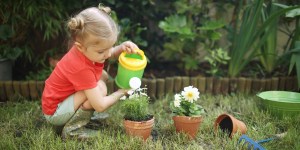In honor of Dr. Montessori's birthday, here are some key thoughts from her writings that give great insight into how children learn.
Today marks 151 years since a baby girl was born in Chiaravalle, Italy, whose work would someday change the world. Maria Montessori was a physician and scientist whose research on early childhood education developed into the popular Montessori Method, now found in schools around the globe.
Montessori’s methods of sensitive respect for young children were highly unusual for the time. She created schools in which children could learn through hands-on, tactile materials and care for their own environments through practical life skills.
Although her methods seemed revolutionary in her era, she maintained that she was not creating a method but simply sharing with adults the natural educational process that children have for themselves. “It is not true that I invented what is called the Montessori Method,” she once said. “I have studied the child, I have taken what the child has given me and expressed it, and that is what is called the Montessori Method.”
Today, her ideas are popular thanks to the clear success of her methods. And her work has benefitted countless children and families in the decades since she lived.
In honor of her birthday, here are 10 thought-provoking quotations from the writings of Dr. Maria Montessori. Each one gives great insight into her discoveries about how children learn.
1
“We must help the child to act for himself, will for himself, think for himself; this is the art of those who aspire to serve the spirit.”
2
“The greatest gifts we can give our children are the roots of responsibility and the wings of independence.”
3
“Respect all the reasonable forms of activity in which the child engages and try to understand them.”
4
“Education is not something which the teacher does, but a natural process which develops spontaneously in the human being.”
5
“The great principle which brings success to the teacher is this: as soon as concentration has begun, act as if the child does not exist.”
6
“The child who has never learned to work by himself, to set goals for his own acts, or to be the master of his own force of will is recognizable in the adult who lets others guide his will and feels a constant need for approval of others.”
7
“One test of the correctness of educational procedure is the happiness of the child.”
8
“The first essential for the child’s development is concentration. The child who concentrates is immensely happy.”
9
“Children are human beings to whom respect is due, superior to us by reason of their innocence and of the greater possibilities of their future.”
10
“Never help a child with a task at which he feels he can succeed.”

